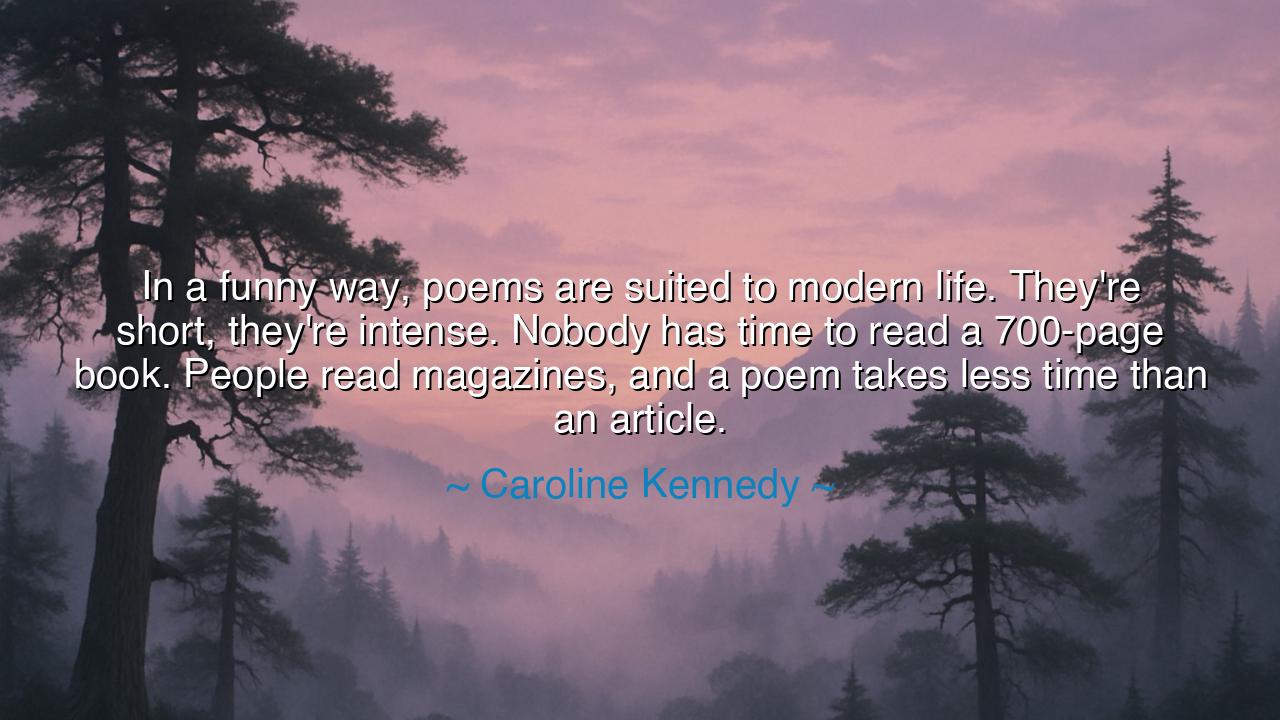
In a funny way, poems are suited to modern life. They're short
In a funny way, poems are suited to modern life. They're short, they're intense. Nobody has time to read a 700-page book. People read magazines, and a poem takes less time than an article.






“In a funny way, poems are suited to modern life. They’re short, they’re intense. Nobody has time to read a 700-page book. People read magazines, and a poem takes less time than an article.” Thus spoke Caroline Kennedy, daughter of legacy and lover of words, and though her tone is gentle, her insight cuts to the very heart of our age. For in her reflection lies a truth both sorrowful and profound: the rhythm of the world has quickened, and the pulse of time beats faster than ever before. Yet in this whirlwind, poetry endures, not because it resists the age, but because it adapts to it—because it carries, within few words, the full weight of human feeling.
The ancients believed that wisdom need not be long to be deep. A single verse from Homer could stir the heart like a tempest; a few lines from Lao Tzu could unveil the path of eternity. Caroline Kennedy, speaking to her own century, reminds us of this same law. The poem is a vessel for essence, not for excess. It is brief, yet boundless. Where novels stretch across hours, a poem strikes in seconds, as lightning strikes the mountain—and leaves its mark forever. In a world of distractions, where thought is scattered and attention fleeting, poetry becomes not a relic, but a refuge: the ancient art reborn for a hurried age.
There is irony in her observation—“in a funny way,” she says—for what she reveals is that the very conditions that seem to endanger art have instead prepared a new home for it. The shortness of our attention has made us hungry for intensity; our noise has made us long for silence. A poem, in its smallness, answers both. It is the pause between breaths, the moment when time bends and the heart listens. Where the modern man scrolls through endless words, the poem compels him to stop—to dwell, if only for a minute, in something real.
Consider the poet Haiku master Bashō, who wandered through the mountains of Japan with little more than his sandals and his soul. In seventeen syllables he could capture eternity: “An old silent pond— / a frog jumps into the pond, / splash! Silence again.” In our age of speed, such brevity would seem natural, almost modern. And yet, that simplicity was born centuries ago. Thus Kennedy’s insight reveals a circle: the old form has met the new need. The poem is timeless, for it mirrors both the stillness of the past and the rush of the present.
But poetry does not survive merely because it is short. It survives because it is intense. It compresses the infinite into the instant. A single image—a child’s laughter, a dying leaf, a lover’s sigh—can contain the whole of existence. The poem demands of its reader the same focus that life itself demands when it is truly lived. In this way, poetry trains the modern soul to feel again. It teaches that even within haste, there can be depth; even within limitation, there can be infinity.
Caroline Kennedy’s words are also a quiet warning. When she says that “nobody has time to read a 700-page book,” she is not mocking the modern mind; she is mourning its exhaustion. Our time is filled with sound but empty of stillness. The poem becomes, then, an antidote to the disease of distraction—a way to touch meaning without losing breath. To read a poem is to drink from a spring instead of a flood. It is to remember that the human heart does not need much to be moved—only truth, spoken cleanly.
Let this be the lesson, then: seek the poetic moment in all things. When you have no time, take a fragment of time. Read a verse, write a line, pause before the dawn and listen. Do not measure the value of words by their length, but by their life. The ancients carved wisdom into stone, the poets carved it into air—and still it endures. For poetry, as Kennedy teaches, belongs to every age that remembers how to feel.
So, traveler of this hurried world, remember this: the poem is the soul’s heartbeat made visible. It is short because life is short. It is intense because life is precious. And though our books grow longer and our attention grows thin, poetry remains eternal, reminding us that meaning does not depend on the measure of pages, but on the depth of a single breath.






AAdministratorAdministrator
Welcome, honored guests. Please leave a comment, we will respond soon